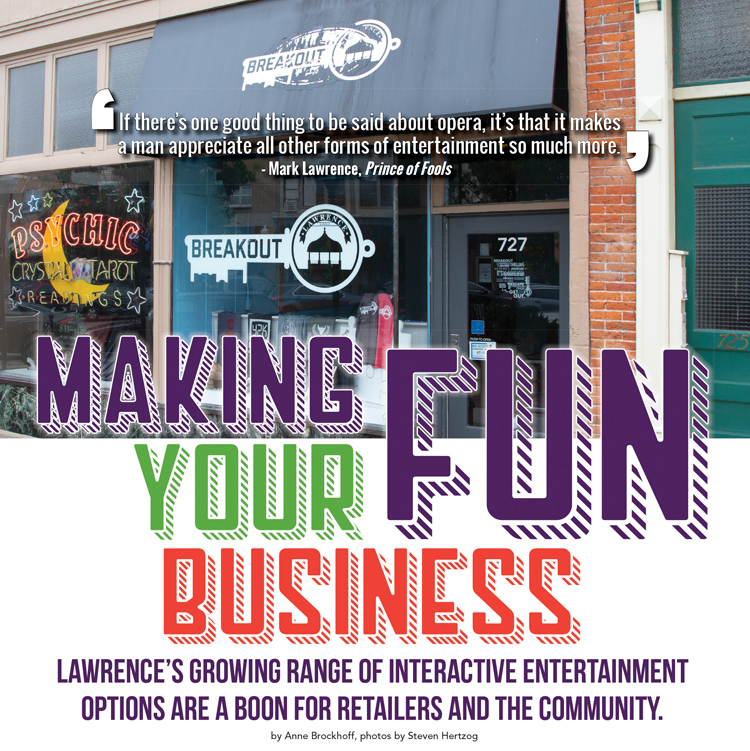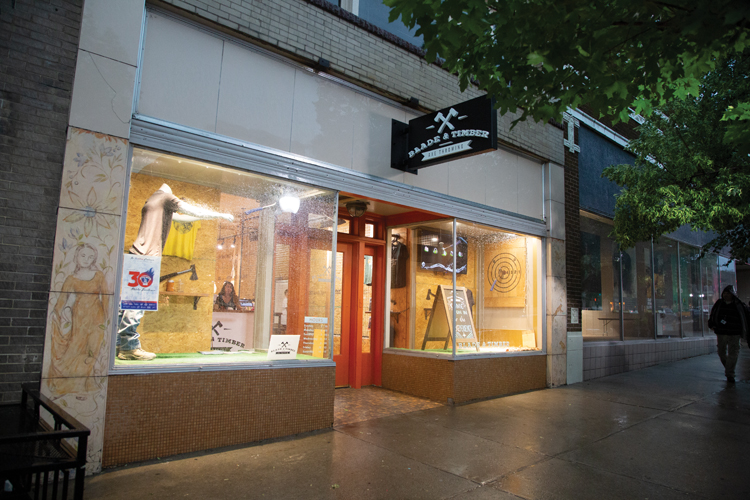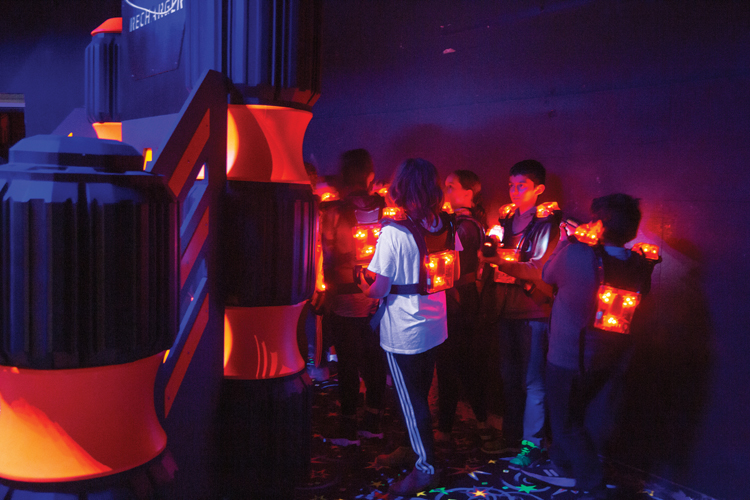Lawrence’s growing range of interactive entertainment options are a boon for retailers and the community.
| 2019 Q2 | story by Anne Brockhoff | photos by Steven Hertzog

It’s one thing to relax by throwing axes or shooting paintballs. It’s another to turn those activities into a business. But entrepreneurs who focus on creating shared experiences are a dynamic part of Lawrence’s economy, in large part because people just want to have fun—and they’re willing to pay for it.
“That’s the sweet spot we play into,” says Matt Baysinger, cofounder of Blade & Timber Axe Throwing. Sharing that spot are Breakout Lawrence, Laugh Out Loud Family Zone, Epic Fun Center, Drop Zone Paintball Park and The Dragon’s Hoard Games and Hobbies. Their popularity doesn’t just benefit their owners; it’s a boon for retail neighbors.
Indeed, a 2019 survey by the International Council of Shopping Centers showed entertainment is the main reason more than 60 percent of shoppers head to brick-and-mortar destinations. Customers visit more frequently when shopping centers and downtowns offer non-retail entertainment and dining options, stay longer and spend more, Baysinger explains.
“There’s this whole behind-the-scenes thing happening with retail in America that we are a part of,” he says of the interactive entertainment sector, also known as retailtainment or entertainment retail. “There’s a real shift in retail spending.”
Baysinger’s been at the forefront of that shift since 2014, when he and his friend, Luke Thompson, created Mass Street Soda. (Thompson bought him out in 2017.) Soon, Baysinger added another idea to the mix: live-action escape rooms.
He and another buddy, Ryan Henrich, launched Breakout KC in 2015. Their company, Swell Spark, followed with locations in Lawrence, Leawood and Honolulu, and added Get Out: Omaha and the Get Out Games Mobile Escape Room. Swell Spark opened and later sold a Breakout site in Columbia, Mo., and then, in late 2018, sold Breakout Lawrence to Brad Boullear.

Morningstar Care Homes take their staff for a day off of group fun and entertainment at Breakout
“It was a great fit with Brad,” says Baysinger, who continues to develop other concepts at Swell Spark. “We really loved him and wanted it to go to him.”
Boullear retained Breakout Lawrence’s general manager, Zach Koehn, and 10 part-time employees, and plans to contract with Swell Spark to maintain brand consistency. He’s working to analyze sales data to improve repeat visits and is expanding online marketing efforts: Adding promo codes and boosting posts on Facebook, and working with Downtown Lawrence Inc. to create push notifications for events like the Kansas Craft Brewers Expo have proven especially effective. New signage created by Luminous Neon Art & Sign Systems will improve visibility. Networking at Unmistakably Lawrence events and developing collaborative relationships with nearby restaurants and retailers is also key.
“I love being part of downtown Lawrence,” Boullear says.
Baysinger’s equally committed to Lawrence, where he still lives even though Swell Spark is based in Kansas City, Kansas. Its first Blade & Timber Axe Throwing opened in Kansas City in 2017, followed by Lawrence, Leawood, Wichita, Seattle and Honolulu. The company plans to expand further into Minnesota, Oregon, Florida and Arizona.
Lawrence is its smallest storefront, with 1,200 square feet, four lanes and eight employees. Guests can buy snacks and soft drinks, and there are leagues, tournaments and special events—they even help Girl Scouts work toward their axe-throwing badges. The main goal though? To connect people with each other and with downtown Lawrence.
“It’s really exciting for me and my company to be a part of (Lawrence) and add value to the town,” Baysinger says.

Blade and Timber
Growing Families, Growing Lawrence
Christie and Charles Peterson feel much the same about Laugh Out Loud Family Zone, which they opened downtown in 2012. It wasn’t an easy decision. The couple owned an experiential education company at the time, and Christie was pregnant with their second child. Nor was her market research encouraging: It suggested that activity centers are generally successful only in communities with 100,000-plus residents.
“The reality of this business is it is a very tough financial market,” Christie Peterson says. “We went into it with our eyes wide open.”
They believed local families needed something like LOL, as it’s called. So the Petersons wound down their company to work full-time on the business during its first two years. Charles Peterson now works elsewhere, but he still volunteers 10 to 15 hours a week doing facility cleaning and maintenance. Suzanne Baur, Christie’s mother and a retired certified public accountant, contributes five to 10 hours toward accounting and other tasks.
“Without my mom and my husband, we couldn’t do this,” says Christie Peterson, who also has 10 to 15 part-time employees.
Not that she’s complaining. Christie Peterson loves being downtown, and LOL benefits from its proximity to local events and family destinations, including Sylas and Maddy’s Homemade Ice Cream, The Toy Store and the Lawrence Arts Center.
They built out their high-ceilinged site mostly by themselves, and it now sports a multilevel play structure, jump pillow, climbing wall, imaginary play areas and other features that provide kids from ages 1 through 12 with a mix of physical, creative and artistic play.
It’s buzzy and noisy whenever school’s not in session, but about 70 percent of the time, LOL is quiet, with only a handful of parents playing with their kids or taking advantage of the free Wi-Fi to study or work. The Petersons offer memberships, a Music & More class taught by Sunflower Music and a kids’ volunteer club. The food menu offers requisites such as peanut butter and jelly sandwiches, as well as more grown-up paninis and rice bowls. LOL occasionally holds special events, but the real draw is birthday parties.
“It’s what drives us,” Christie Peterson says. “That’s the backbone of our business plan.”

5th graders from Cordley Elementary School enjoy a few hours of playing laser tag and arcade games at Epic Fun in the Malls Shopping Center
Birthday Boom
Parties are also key at Epic Fun Center, in The Malls Shopping Center. College students prefer late-night ones, and Epic offers team-building options for daytime. But birthdays rule. Epic hosts six to eight every Saturday, plus more on Friday nights and Sunday afternoons, mostly for 5- to 12-year-olds.
“The party rooms, the arcade, the laser tag—that’s really exciting to them,” owner Terry Jacobsen says.
It’s the kind of family entertainment center Terry Jacobsen wanted for his own kids (he has seven) but couldn’t find in Lawrence. When his son, Travis, graduated from the University of Kansas, they decided to start one.
Travis Jacobsen crafted a business plan, found the 10,000-square-foot space and renovated it with the help of his wife, Ellen Jacobsen. Changes like removing a dropped ceiling, building party rooms and tiling the floor were self-financed, but the family took out an SBA (Small Business Administration) loan to buy equipment.
It was a significant expense, Terry Jacobsen says. Laser tag vests cost about $3,500 each at the time, and Epic needed 30. The family also purchased arcade games instead of renting, enabling guests to pay by the hour rather than by the game.
“That made it a bigger benefit for parents,” says Terry Jacobsen, who opted to sell pizza, popcorn, candy and bottled drinks instead of adding a full kitchen. “You can go through a lot of quarters with kids in an arcade.”
Travis Jacobsen managed the business when it opened in 2016 but then stepped back last year to pursue other opportunities. Terry Jacobsen took over, balancing Epic’s needs against his responsibilities as coowner of Printing Solutions, in North Lawrence.
Terry Jacobsen’s nephew, Gabriel Johnson, now oversees daily operations and manages Epic’s six employees. Travis Jacobsen still repairs arcade and laser tag equipment, which saves Epic hundreds of dollars every time something goes wrong. But Epic’s biggest challenge? Getting the word out to local families.
Early advertising efforts didn’t yield the hoped-for results. More effective has been Epic’s school fund-raiser program. The business partners with parent-teacher organizations and other groups to bring families in, then donates 50 percent of the entry fee back to the organization.
“I’ve always had a big place in my heart for the education system and schools,” Terry Jacobsen says. “It made sense for me to use Epic in that way. It’s actually good advertising for us.”

Ken Farris, owner of Drop Zone Paintball Park plays Disc Golf with his team on the Centennial Park Disc course
Forging a Paintball and Disc Golf Connection
Staying relevant is another challenge for any interactive entertainment business, and it’s one Ken Farris, owner of Drop Zone Paintball Park, is well-placed to meet. Farris opened the 89-acre park on the Douglas-Franklin county line in 1988 just as paintball was taking off. Players back then preferred owning their own equipment, so he added a retail store in Olathe in 1998 before expanding to Topeka and Gladstone, Missouri. The company became the national service provider for Tippmann Sports, a leading manufacturer of paintball gear and accessories, and in 2002, located a central distribution site in Lawrence.
The market shifted, however. Lighter-weight equipment became more popular, as did smaller, low-impact paintballs. Players increasingly preferred renting equipment, and Farris closed his three out-of-town stores. He still sells paintball guns, paintballs, clothing and other supplies at his Lawrence location, but customers can just as easily purchase it on the Drop Zone web site, eBay or Amazon—Farris has set up systems to streamline inventory and distribution regardless of which platform shoppers use.
The game has matured, but it still has wide appeal. Drop Zone’s park is open year-round to anyone over age 8 who can wear the required safety equipment, although it’s reservation-only from December to February. Each course is routinely inspected for safety and to make sure towers, bunkers and other obstacles on the well-defined courses are in good repair.
A few of Drop Zone’s 10 to 13 full- and part-time employees work at the park, but most are based in Lawrence, where the company’s also expanding into the surprisingly robust disc golf market. The Professional Disc Golf Association claimed 46,457 members in 2018 and counted 8,108 courses nationwide, including those at Centennial Park, Riverfront Park and Clinton Lake in Lawrence, and two in Ottawa.
“Our big push is to grow disc golf. That’s where we see growth,” Farris says.
In disc golf, or Frisbee golf, players throw a high-tech disc at a target trying to score in as few throws as possible. Players use a variety of discs, and DZ Discs has an inventory of 14,000 available. Farris focuses on retail sales, both in-store and online, as well as on developing relationships with suppliers and a national presence among players. Toward that end, he formed Team DZDiscs, something of a social support club for about 200 players in various states that helps them feel a part of the larger disc golf community.
“They are our evangelists,” Farris says. “They tell people about us.”
There are disc golf leagues and tournaments, but friends can just as easily get together to play on a public course. The sport has much in common with paintball, Farris says, particularly in the way they both bring people together.
“We don’t work with individualized sports that you completely do on your own,” he says. “We’re all about connecting groups.”
Board Games Captivate Customers
That’s also at the heart of The Dragon’s Hoard, a tabletop game shop D. Cooper, Anne Cooper and Gage Buffington opened in east Lawrence in 2018. The store stocks Warhammer, Lords of the Waterdeep and other games, as well as the accessories that go along with them, but D. Cooper knew they couldn’t compete against the internet on sales alone. They had to create a community of the sort each of the owners had enjoyed in other cities.
“One of the things we focus on is just having a place for people to come and hang out,” says Cooper, who grew up playing games like Magic: The Gathering and has informally consulted with other shops in the Midwest. “They don’t feel pressured to buy anything. They can just have fun.”
The Dragon’s Hoard offers open tables where anyone can play any game, as well as demo days, tournaments and other events. There’s also a demo shelf so customers can play before they buy. The store operates most days until 10 p.m. On “late nights,” five to eight tables continue playing after the cash register closes. Soft drinks and packaged snacks are available, and customers are allowed to bring in food.
Some are groups of friends who’ve arranged to meet; others are drop-in players, and the numbers are growing. That’s why game-making company Games Workshop opened one of its Warhammer stores (named after the company’s leading game) in 2018, offering another local outlet for both games and events.
“It’s a growing area,” James Bell, Games Workshop marketing specialist for North America, says of Lawrence.
Cooper hopes that growth will continue. The Dragon’s Hoard has yet to turn a profit, and all three owners still have full-time jobs elsewhere. But the store has broken even every month since it opened—something that still comes as a surprise to Cooper.
“People want this in Lawrence. I just didn’t know they wanted it so much,” he says.
